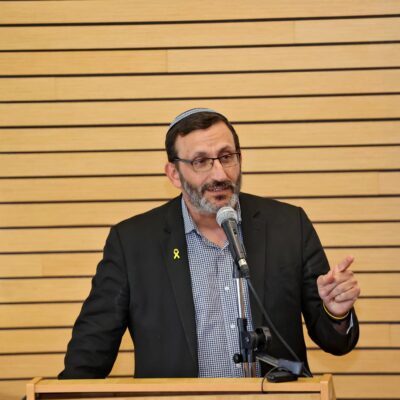Opinion
Torah on demand
Expanding Jewish education: The gig economy for learning
In Short
Making religious study more flexible — for teachers and students — opens it to people who would ordinarily struggle to find the time for it
More than 1 in 3 American workers, or 58 million adults, hold freelance jobs or project-based contracts as part of the gig economy. Economic shifts and advances in technology have brought the innovation of side gigs to nearly every industry, and now it’s reaching Jewish education.
Like so many other busy people, my own pursuit of independent work was shaped by my chosen profession and by family priorities. As a rabbi raising very young children with a very busy spouse, I sought meaningful work that would also grant me flexibility, but I didn’t find a lot of opportunities for flexible rabbinic roles that aligned with my available hours.
GETTY IMAGES
After spending a few years cobbling together short-term projects, I set out to build what I wished had existed: a framework for independent Jewish clergy and educators to reach individual learners and share wisdom and guidance. The platform I envisioned would help others, like me, who wanted to retain their sense of identity as a rabbi or educator after investing so deeply in their education. And it wouldn’t lock them into traditional 9-5 jobs.
Today, that framework has grown into the successful Jewish Learning Collaborative (JLC). JLC matches freelance Jewish educators with Jewish communal professionals and lay leaders for individual, customized and self-directed Jewish learning. More than 120 clergy and educators located across the U.S., Europe, and Israel teach employees and volunteers at 37 Jewish organizations for more than 450 hours every month. Our educators cultivate understanding, connection and belonging through the exploration of topics as diverse as intro to Jewish ritual and holidays, feminism in the Talmud and Jewish spirituality.
The availability of flexible teaching opportunities for talented, dedicated Jewish educators helps our community retain teachers. JLC’s educators are rabbis, rabbinical students, professors and graduate students. They have post-college-level credentials. They are experts in general and esoteric fields and are warm, relational and nonjudgmental. They are relatable to learners for diverse reasons. And, perhaps most importantly, they are valuable assets to the Jewish people.
Without freelance opportunities, these educators could drift into more flexible professions or opt out of the workforce all together. Even with remote work options, employment at Jewish organizations frequently requires traditional hours. Part-time roles in Jewish education are often limited to teaching children in congregational schools or tutoring b’nei mitzvah students. And educators who move abroad would also be at risk of exiting the field if it were not for the opportunity JLC provides them to teach over Zoom and earn U.S.-dollar pegged incomes.
The freelance economy for Jewish education removes these limitations and empowers educators to stay connected to the Jewish community and to their roles as teachers — on their own terms. And it allows them to specialize in their areas of passion. A rabbi interested in Jewish mysticism can dive deep into Kabbalah with an equally enthusiastic learning partner and never teach a class on prayer. That’s a completely different model than the generalist rabbi, and it empowers phenomenal educators who want to focus on teaching people who share their individual passions.
Like other participants in the gig economy, some JLC educators contract projects on top of their day jobs to fulfill a financial or personal need. Some have administrative roles in Jewish organizations but love teaching. Some are professional fundraisers who miss exploring rich ideas with a partner. One has a master’s degree in Talmud and wants to maintain her Jewish professional capabilities while pursuing a Ph.D. in theater. These educators appreciate the stability of their jobs and value their “side hustle” for keeping them connected to learning. Other JLC educators teach 30 hours each month and earn most of their income from freelance work.
Democratizing Jewish teaching also expands Jewish learners’ access to highly skilled educators. In the past, an eager learner might hope to find a teacher in their town who had the skills, knowledge and bandwidth to help them untangle a particular piece of Jewish source text. Now, that learner has access to experts all around the world.
Jewish learners can also learn with someone who matches their “vibe” — someone who shares their background, demographic characteristics, age range or political leanings. JLC’s roster includes educators who are a good match for every potential learner, even those who might not connect with the teacher assigned in a cohort-based learning program.
The Jewish learning gig economy empowers talented people who love to teach and were previously underutilized by our community. The number of teachers who want to work with us has quickly positioned JLC as one of the largest employers of Jewish educators in the country and revealed an existing demand for personalized learning and teaching.
Now, the Jewish community needs more avenues for people to access the wisdom and expertise of talented educators. Effective platforms for teaching empower Jewish clergy and teachers to join professionals in other sectors who enjoy flexibility and customization in their careers and supplemental income – all while enriching our community.
Rabbi Ana Bonnheim is the founding executive director of the Jewish Learning Collaborative.

 Add EJP on Google
Add EJP on Google










